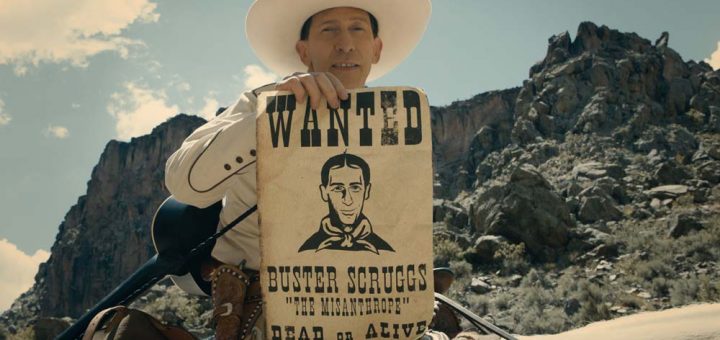Why The Ballad of Buster Scruggs is tailor-made for Netflix

By Colin Macgillivray, Arts Editor
Joel and Ethan Coen undoubtedly share a fondness for the Old West. Their latest flick, The Ballad of Buster Scruggs, is a deeply entertaining, yet harrowing composition of six frontier tales that plays as a love letter to the dying western genre, all while being arguably the duo’s best film in years.
Originally intended as a six episode anthology series, the brothers decided to condense their wildly unique stories into a feature film. A brilliant move, as it forces you to binge Buster Scruggs in its entirety and weave together the overarching theme of mortality that is creatively showcased in the six chapters.
In the titular chapter, ‘The Ballad of Buster Scruggs,’ the Coen’s expertly subvert the heroic cowboy narrative through Buster Scruggs — played by the supremely talented Tim Blake Nelson — a clean-cut, psychopathic songbird with a penchant for violence and vibrato. Chalk-full of dark humour, chapter one is by far the most unique in both tone and presentation, whimsically portraying the downfall of the best in the west.
Although it may be the weakest of the six, ‘Near Algodones’ offers more of the Coen’s signature wit. Following a cowboy who decides to rob a remote bank and is subsequently outwitted by an eccentric bank-teller, chapter two affirms the film’s macabre motifs and that you can’t escape the hangman’s noose.
Chapter three, ‘Meal Ticket,’ stars Liam Neeson as an aging impresario who frequents remote towns with a limbless thespian, Harrison, who recites classic prose to increasingly small audiences. Without spoiling the heartbreakingly grim story — which will likely be the most divisive of the Coen’s shorts, — ‘Meal Ticket’ is a deeply disturbing piece of poetry that acts as an allegory for the death of art in the modern age.
After leaving the audience rather downcast, ‘All Gold Canyon’ is a heartwarming, one-man show about resilience, greed and the American Dream. Tom Waits, the magically gifted singer-songwriter turned actor, plays an aged prospector who stumbles upon a serene canyon and diligently works to unearth a pocket of gold he is convinced hides beneath his feet. Carried by a phenomenal performance by Waits, a brilliant score and stunning visuals, ‘All Gold Canyon’ is Buster Scruggs at its finest.
‘The Gal Who Got Rattled’ is the longest of the shorts, bringing with it heaps of tragedy, romance and charm. Following Alice Longabaugh, played by the underrated Zoe Kazan, en-route to Oregon via wagon train, chapter five almost feels like a feature film that is perfectly condensed. This section’s cast of characters all deftly deliver a delightfully sweet, but tragically shocking story of bad things happening to good people.
The final story, ‘The Mortal Remains,’ follows the conversations of five individuals as they take a stagecoach ride. Chapter six can be viewed as the film’s epilogue, a parable that bids farewell to the Western genre as it passes into the unknown. Or, it can be viewed as a supernatural stagecoach ride in which three strangers attempt to process death as they are accompanied to their final destination by two bounty hunters. It’s the perfect end to Buster Scruggs, as the Coen’s focus on love, life and death from varying perspectives.
Although some of the chapters are admittedly stronger than others, Buster Scruggs is extremely entertaining and an unquestionably creative film that boasts enough variety in which everyone can fall in love with western films all over again.


